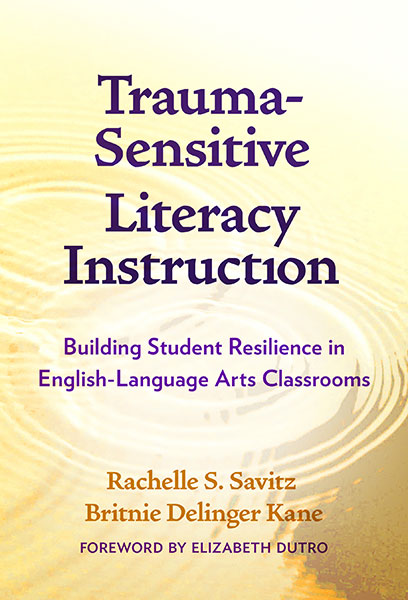Professors: Request an Exam Copy
Print copies available for US orders only. For orders outside the US, see our international distributors.
Rachelle S. Savitz, Britnie Delinger Kane
Foreword by: Elizabeth Dutro
Publication Date: July 28, 2023
Pages: 176

It is vital for educators to be aware of how traumatic experiences affect today’s students, yet few teachers learn the tools needed to successfully teach these students. This book highlights how English Language Arts teachers, who are typically not licensed or specifically trained to work with trauma issues, can design and implement instruction that helps students see that they are supported. Readers will find specific strategies for teaching literacy based on the authors’ extensive knowledge and experience in trauma-sensitive instruction, adolescent literacy, and culturally responsive and sustaining pedagogies. The authors show how to support middle and high school students with specific literacy practices (reading, speaking, listening, and writing) that build resilience. Trauma-Sensitive Literacy Instruction is for the many teachers who are unsure how to invite students and their traumas into classroom instruction and embed critical discussions and learning within their teaching practices and pedagogy. It will help ELA teachers navigate student trauma in a way that empowers both students and teachers.
Book Features:
Rachelle S. Savitz is an associate professor in the Department of Literacy Studies, English Education and History Education in the College of Education at East Carolina University in Greenville, North Carolina. Britnie Delinger Kane is an associate professor of literacy education in the Zucker Family School of Education at The Citadel in Charleston, South Carolina, where she also serves as the department head.
“The authors describe the negative effects of trauma and give suggestions to teachers for how they can help without taking on the role of certified school counselors…. They recommend various classroom activities, including using text sets, book clubs, reading conferences, anticipation guides, circles of viewpoints, and writing conferences.”
—CHOICE
“(A)n approachable, actionable, and relevant reference for literacy instructors.”
—Teachers College Record
“In this book, ELA teachers will find actionable pedagogical practices toward the transformative teaching that trauma demands and the respect, care, and support along the way that ELA educators need and deserve.”
—From the Foreword by Elizabeth Dutro, professor, University of Colorado Boulder
“To empower learners—which is the fundamental point of ELA—teachers need the heart, knowledge, and skills to strategically address the complexity of students living in trauma. Authors Savitz and Kane make stories concerning our most vulnerable children the axis of their book and provide a hopeful message to those educators who see and care: We can help.”
—Todd Finley, associate professor, East Carolina University
“Savitz and Kane’s book clearly and compassionately supports ELA teachers, preservice and in-service, in understanding the various types of trauma that adolescents bring with them into classrooms. The text provides teachers with concrete strategies and classroom stories of culturally responsive and sustaining pedagogies that help advance students’ multiple literacies and their social emotional well-being. This timely book is a must-read for all middle and high school ELA teachers trying to support their students in a post–COVID-19 world.”
—Jacy Ippolito, professor, Salem State University
Contents
Foreword ix
Acknowledgments xiii
1. Introduction 1
What Is Trauma? 4
Trauma in Schools 6
How Does Trauma Influence Learning? 8
How Can Schools Become More Supportive Places? 9
The Purpose of This Book 11
Who Are We and Why Are We Writing This Book? 13
2. Five Pillars of Trauma-Sensitive Literacy Instruction (TSLI): The Framework 14
The Research Base for This Book 17
Five Pillars of Trauma-Sensitive Literacy Instruction: A Framework 19
3. Curating Appropriate, High-Quality Literature in TSLI 34
What Does Literature Have to Do With It? 35
Curating Novels to Build Classroom Libraries 47
Conclusion 58
4. Critical Dialogue and Discussion in TSLI 59
Dialogic Teaching and Critical Literacy Practices 60
5. Using Writing in TSLI 76
What About Teachers? Should We Be Using Expressive Writing to Support Students Experiencing Trauma? 78
Teaching Writing in Trauma-Sensitive Ways 79
Conclusion 94
6. Critical Inquiry in TSLI 95
Critical Inquiry as a Trauma-Sensitive Literacy Practice 96
Guiding Principles for Designing Units of Trauma-Sensitive Critical Inquiry 98
Conclusion 108
7. Hot Moments—Teacher Self-Care 110
Handling Hot Moments 111
The Emotional Labor of Teaching, Compassion Fatigue, and Compassion Satisfaction 125
Conclusion 134
References 135
Index 151
About the Authors 161
Professors: Request an Exam Copy
Print copies available for US orders only. For orders outside the US, see our international distributors.